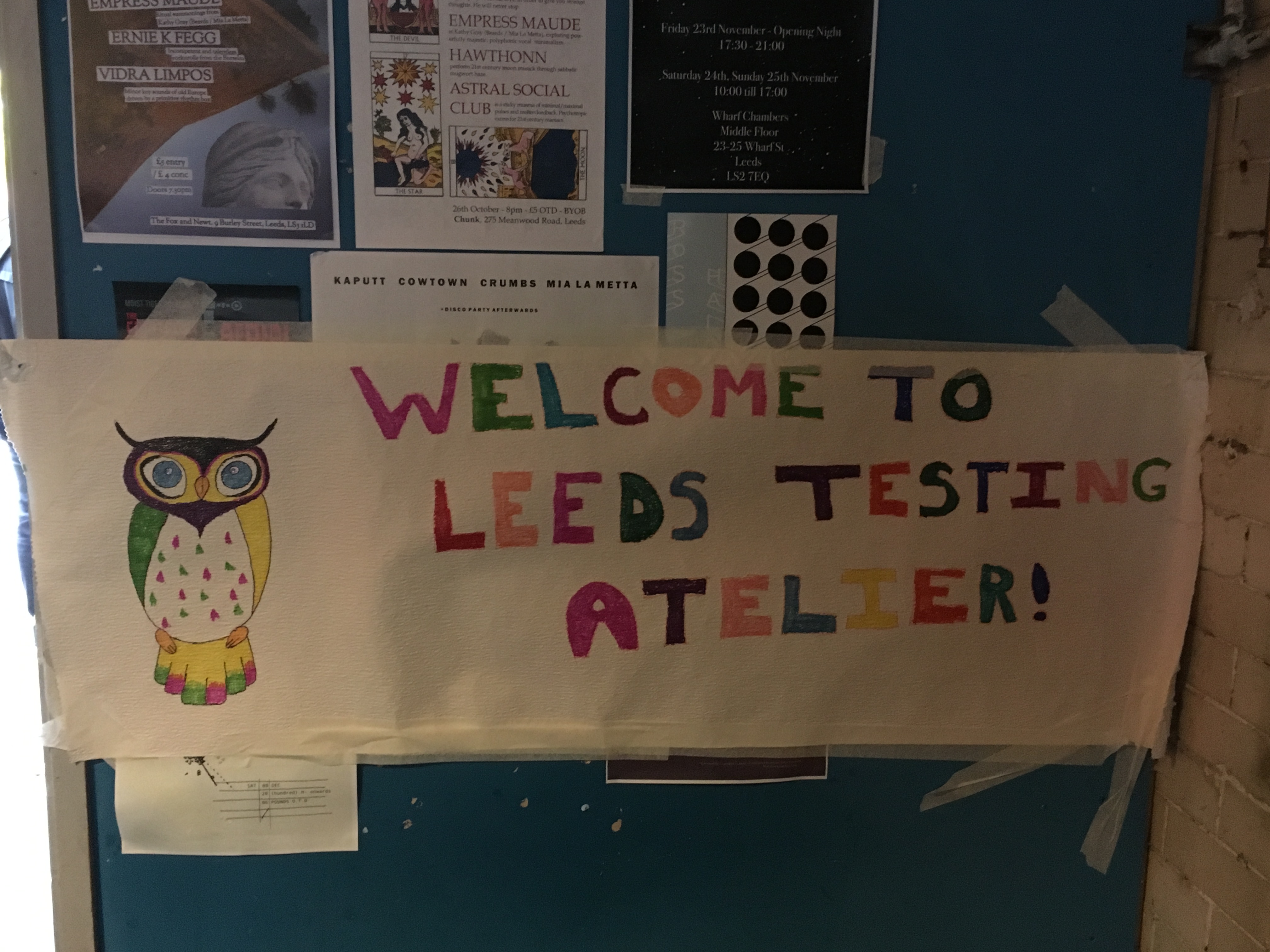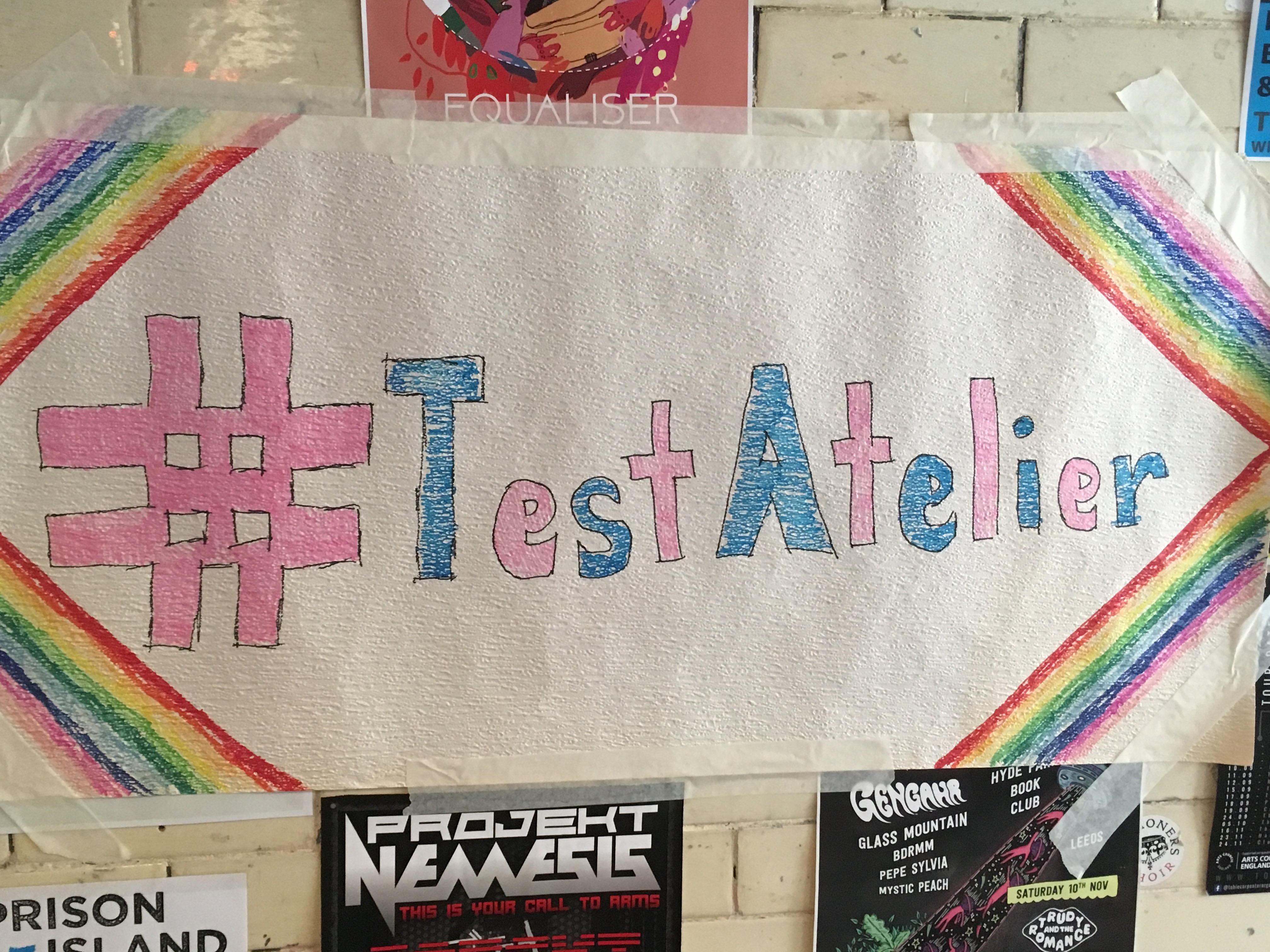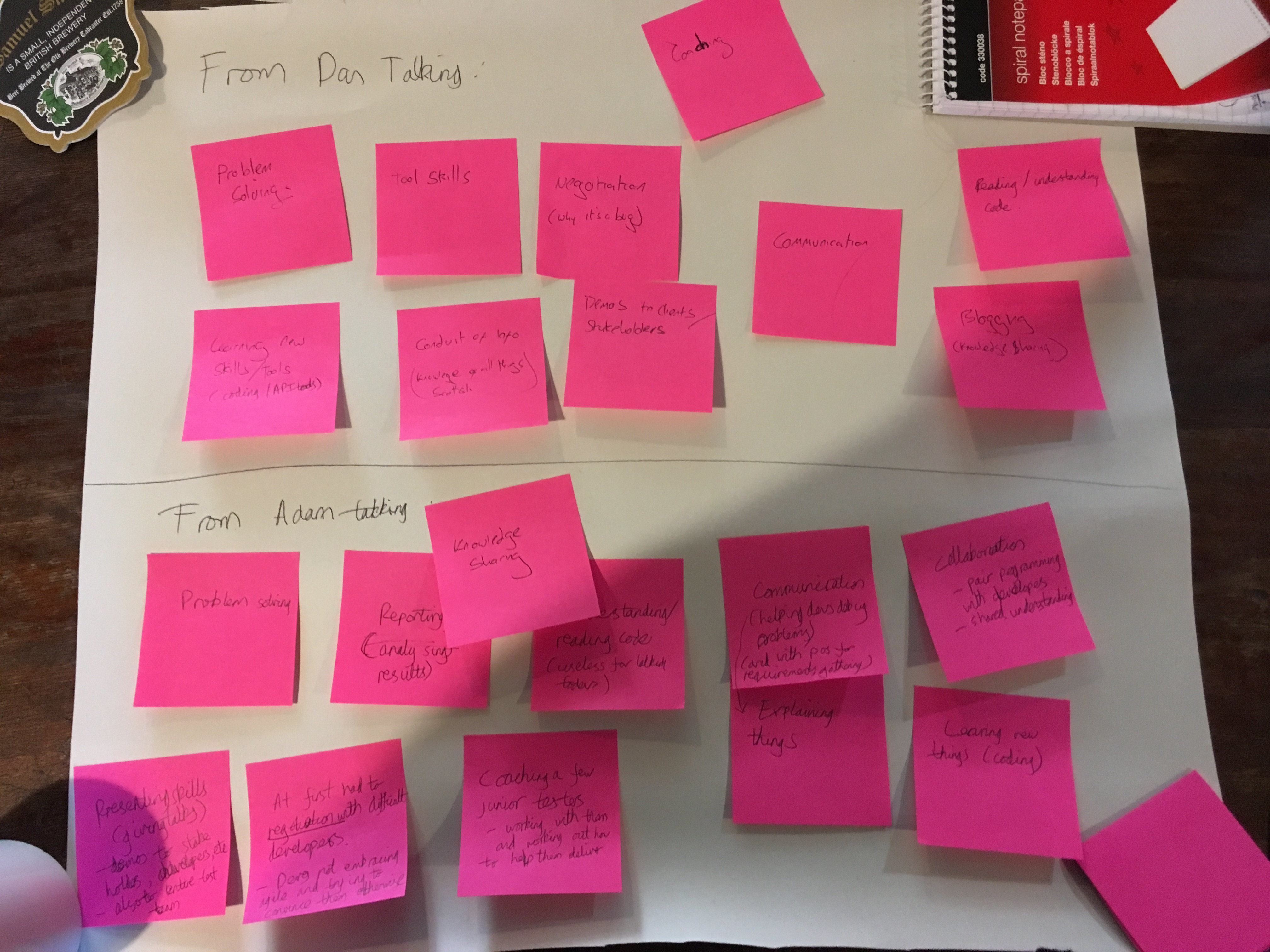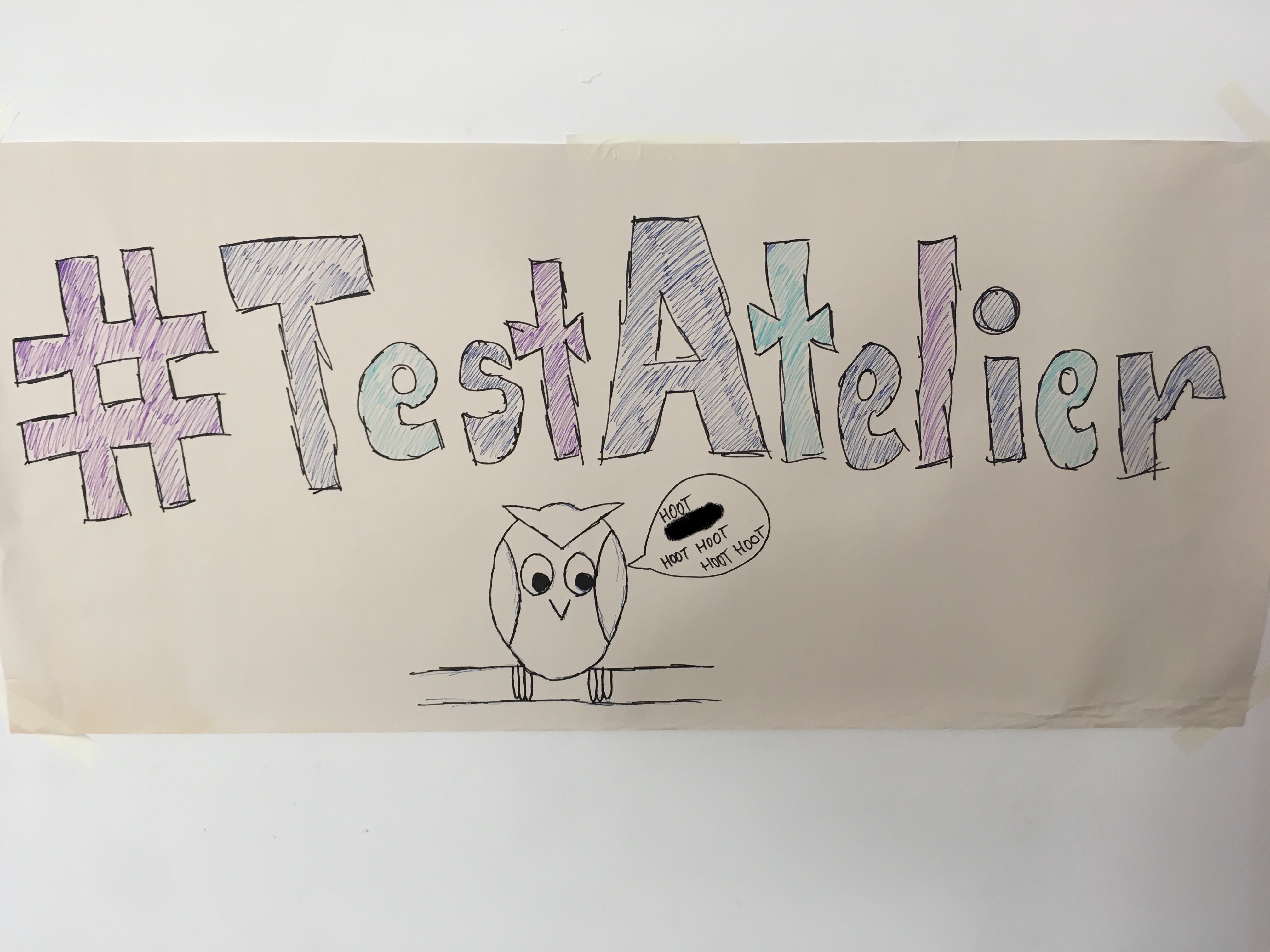Leeds' very own “fully independent” and “punk” testing event

Introduction
On October 9th 2018, Chris Spence and Dan Matthewman from cap hpi's testing team attended the 7th ever Leeds testing Atelier. So what on earth is Leeds Testing Atelier? Well, it is a testing conference held in Leeds every April and October at the Wharfe Chambers social club. It describes itself as “fully independent” and “punk.” They also pride themselves on being accepting of all people regardless of gender, looks, background, orientation or religion (or lack thereof). This is an event where you can learn about the latest testing techniques that are out there, have a few laughs, meet new people and catch up with old work colleagues. And on top of all that, the food, drinks and entry is ALL FREE!
On arrival
So, after arriving, we helped ourselves to some free goodies which included pens, post it notes, badges, a fidget spinner (that Dan has already become addicted to), and some kind of spray (it's either perfume or lens cleaner, but neither of us could tell and we didn't want to risk spraying it on Dan's specs just in case). Then we were greeted by a green haired lady shouting “GOOD MORNING, IT'S F****** GOOD TO SEE YOU ALL” (her words not ours) and then we were given a quick introductory talk where we were all told the one rule of Testing Atelier which is “don't be a d***.”


The sessions
First up, Dan attended the dev ops talk led by Alex of TransUnion (formerly CallCredit). This included content on CALMS; Culture, Automation, Lean, Monitoring and Sharing. Essentially in the dev ops methodology, Automation and Monitoring are things to be included in all steps of the software build while embracing a culture of continuous learning and sharing in order to be able to create reliable software that fails gracefully (should it fail) on the production build. Chris went to a talk which focused on how we work manage/prioritise our workload. This presentation was delivered by Cian who stated that multi tasking is causing brain damage (maybe a bit over dramatic). The purpose of this talk was to be more mindful whilst working to ensure that stress doesn’t impact the quality of our work. Some of the points highlighted were: Accept your mind, Prepare to work, Priority work first and timebox tasks. Next up, we swapped rooms where Chris attended a talk on “It’s not what you do (it’s the way that you do it)” which was presented by Sophie. Sophie talked about different approaches such as Sprint & Kanban and how they’re beneficial to delivering software.
Then, for Dan, it was a talk on how Sky had gone from being 100% manual testing with 2 week regression cycles, to having lots of automated tests which cut the regression testing time significantly. This was one intriguing talk. Here Dan heard about how Sky's testers had no idea about automation at first and had to take baby steps in terms of learning to code. It was also mentioned that they began with writing automated tests for smaller applications and applications that are not released as often and then it all grew from there, but perhaps what was most intriguing was how they had built a device farm powered by BBC Hive CI and we at cap hpi could possibly even look into the possibility of setting up a device farm of our very own. And then it was time for a 30 minute break where one can stretch the old legs, chat to people and I assume most importantly for anyone reading this, grab a pint (there is water, soft drinks and hot drinks if beer ain't your thing though).
After the break Dan attended a session entitled 'Transferable skills to pay the bills' led by testing geniuses Markus and Kim (the geniuses part is not sarcasm, they were great). This began with Dan hitting his head on a low beam before the duo giving us a brief talk through their career emphasising what skills they had learnt that were transferable between multiple roles. After this it was then the audience's turn to do the same. We were asked to pair up so Dan paired up with a chap named Adam from TransUnion where we took it turns to talk through our careers and the other person would pick out what particular skills were mentioned and at the end everyone took it in turns to talk what they had found out in this exercise. Some common skills that were mentioned by a lot of the different pairs included communication, problem solving, decision making, autonomy and even empathy as skills that can be transferred to any project or job inside or even outside the testing market. Meanwhile Chris attended the talk about the making of a conversation. Sometimes the communication between certain areas of the business, for example development & test, can be aggressive/hostile without intending to be. This talk was to focus on how we can unconsciously come across as aggressive in conversations. Chris & Vern then proceeded to take a group of volunteers, split them in two and break down a conversation step by step. The steps were: Intake, Meaning, Feelings, Feelings about feelings, Rules, Defence & Response. The purpose of this was to construct and communicate in a professional manner with our colleagues without causing offence or distress.


After a very tasty lunch, Dan attended a session on contract testing. This was more of an interactive quiz where we were to put in two words about what contract testing means to us, where the majority of people had said 'API' and 'microservice' and then we were given some scenarios where we had to vote on whether we thought a contract test, a functional test, or both. Then, following that, was a talk entitled 'the bugs and the bees' which discussed all of the areas that bugs could come from. Sometimes it is good to reiterate the basics of where bugs come from, because as testers our job is to find them. At the same time as all of that, Chris attended talks on automating your test infrastructure with Kubernetes and accessibility testing. Kubernetes is an open sourced platform for managing containerised workloads and services, that facilitates both declarative configuration and automation (copy and paste job). This was a very interesting topic, which was presented by a developer called Joe. Joe talked about the benefits of using a container-centric management environment and how he uses it in his current role. The link below will give you more information on a topic that’s interesting. https://kubernetes.io/ Then in the accessibility testing talk, Chris heard about how accessibility testing is something that is overlooked by a lot of companies.
This presentation, by Ady, was to highlight how we are failing people with disabilities when we are creating a service like a website for example. How many times have you tested a website with audio descriptions on and your eyes closed? There have been some high profile cases over the years, one in particular is Target. In 2015, the American company spent almost $10 million in damages and legal fees to the National Federation of the blind. What we learned from this presentation was to be more thoughtful when carrying out our testing duties and raise awareness of the problem and how it can be solved. One tool that was highlighted was WAVE (http://wave.webaim.org/), have a look and see for yourself.
And then there was another 30 minute break where you could grab a drink, get some fresh air or relieve oneself if required. After this Chris went to the modern testing lean coffee session which was essentially just an open ended discussion about certain testing topics. There wasn’t much more to say about that. At the same time, Dan went to 'keep talking and no one explodes.' What this entailed was a couple of people playing a game where a bomb was to be defused. One person had to describe the bomb to another person (that was not allowed to look at the bomb on screen) and using these clues, used a paper manual to tell the other player what to do. Then we compared this experience to the role of a software tester in order to compare the similarities that software testing has to bomb defusal. Some things that came out of this were that without clear instructions, we will have problems and that the job can be stressful at times.
The day concluded with the sponsors shouting out about what jobs their company had vacancies for then to conclude we had a laugh when we got to watch a few people play defend the defensible which was essentially a game of articulate where certain people had to keep talking about certain myths of testing for 30 seconds which was a pretty funny way to end the day.
In summary
That was possibly a lot to take in, so how can we sum all that up? Essentially the Test Atelier is an all day event where you can hear talks about the latest testing techniques and methodologies (automation as well as other things), engage in practical exercises, play some games towards the end and have many laughs along the way. Dan learned about some skills that are useful between multiple career roles and about how a device farm can be used to automate device regression tests which is something that cap hpi could create one day. The main things Chris learned were about how accessibility testing is often overlooked and how we can include tests for less abled users as well as the importance of stress management and automating with Kubernetes. The talks and exercises are always different each time the event is hosted so there is always something new to learn each time you go. You can even sign up to give a talk yourself if you so wish and can sign up to that here: https://testingatelier.community/callforpapers And on top of that it has free food and beer as well as free entry. The next Testing Atelier that will be held next Aprill. Will we see any of cap hpi’s testers giving talks at Leeds Testing Atelier in the future? Come along to the Leeds Testing Atelier to find out...